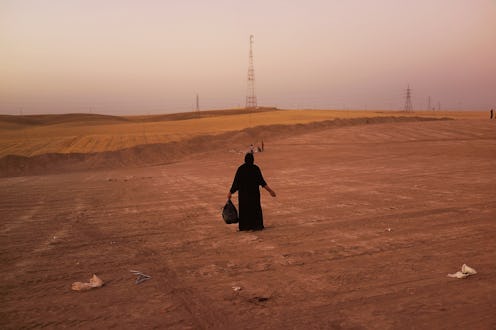News
Amnesty Says ISIS Is "Weaponizing Rape"
On Tuesday, world-renowned human rights organization Amnesty International released a report on ISIS that's about as dark as anything. It's not that the report's findings should come as a surprise — the so-called Islamic State has been very open about its mass public executions, after all — but it's a harrowing reminder of the unique risks women experience under the group's reign. According to Amnesty's report, ISIS fighters are effectively weaponizing rape, using brutal sex crimes as a means to mete out punishment and instill terror.
It probably goes without saying that accessing the report comes with a big trigger warning. As does the summary provided here, because the stories of what these women have suffered within Iraq is a deeply hard read. Since ISIS' rise to prominence and international notoriety, there's a particular population within Iraq that's suffered an inordinate amount of violence, amounting to a genocidal campaign. They're the Yezidis, a minority within Iraq considered blasphemous (and ultimately, disposable) by ISIS.
And according to Amnesty's report, women have been subjected to considerable horrors — the report is culled from interviews with 42 women and girls, detailing the pervasiveness of rape, and their being sold into sexual slavery. Donatella Rovera, Amnesty International's Senior Crisis Response Advisor, laid bare the findings of the report.
Hundreds of Yezidi women and girls have had their lives shattered by the horrors of sexual violence and sexual slavery in IS captivity. Many of those held as sexual slaves are children – girls aged 14, 15 or even younger. IS fighters are using rape as a weapon in attacks amounting to war crimes and crimes against humanity.
Particularly horrible are the report's details of how some women chose suicide rather than continue to live under these atrocious conditions. One 19-year-old named Sinjar recounted to Amnesty that he'd heard his older sister Jilan had killed herself, and the organization ultimately confirmed this through interviews with others who'd been held captive with. The reason Jilan took her own life, according to a 20-year-old named Luna who managed to escape, was to avoid a life of sex slavery.
We were 21 girls in one room, two of them were very young, 10-12 years. One day we were given clothes that looked like dance costumes and were told to bathe and wear those clothes. Jilan killed herself in the bathroom. She cut her wrists and hanged herself. She was very beautiful. I think she knew that she was going to be taken away by a man and that is why she killed herself.
Rovela spoke of the profound trauma that these victims have experienced, and there are a lot of them — beyond the 42 people interviewed for the report, estimates of just how many women and girls are suffering these fates range from hundreds to thousands.
The physical and psychological toll of the horrifying sexual violence these women have endured is catastrophic. Many of them have been tortured and treating as chattel. Even those who have managed to escape remain deeply traumatized.
And sad as it is to say, existence won't be entirely safe for the Yezidi population so long as ISIS remains a potent force in the region — despite recent gains by the Kurdish military, also known as the peshmerga, the terrorist group still has a chokehold on broad swaths of northern Iraq and Syria, and seems hell-bent on wiping out this relatively tiny ethnic and religious minority.
Image: Getty Images
